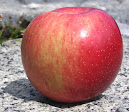 |
This apple doesn't really have a name. It is identified by the grower as Early Spy, but that is a purely local title, neither patented, trademarked, nor enrolled in any one's Registry of Fruit Names.
Instead it is known to the fruit world (if at all) as NY75423-30, which identifies it as a product of the New York State Agricultural Experiment Station.
I picked a right gnarly specimen, ribbed, lobed, and pocked with flyspeck and other defects. It is quite large, with a streaky red blush that is deep in places.
The unblushed peel is a greenish yellow and the whole fruit is decorated with small light lenticels that are nearly invisble outside the blush.
This apple sits hefty and firm in my hand, smelling of moss.
Let's eat it
The flavor is well-balanced and vinous, with interesting black-pepper and other spice notes, but there is a tinge of bitterness as well. I like this for its refreshing flavors and crisp texture; it's a real Fall-in-New-England apple.
 Now, who plants such an obscure variety? It's no heirloom, and there's no
marketing program to help sell NY75423-30 to the apple-loving public.
Now, who plants such an obscure variety? It's no heirloom, and there's no
marketing program to help sell NY75423-30 to the apple-loving public.
The grower is Hutchins Farm, located about a mile north of Concord Center (Mass.) across Monument Road from the Estebrook Woods, where Henry Thoreau spent a good bit of his time.
Hutchins's orchard is not huge, and I
don't suppose they have many Early Spy trees; moreover they are an organic
farm, and (despite an
intriguing history) are
essentially a new enterprise since 1973.
That means the owner got to make lots of decisions that are now bearing
fruit.
The Early Spy apple may have blight-resistant characteristics that make it especially valuable to a chemical-free orchard. Or perhaps the farmer knew and liked this variety, which shows a special interest in fruit. There are other obscure Cornell apples on Hutchins's dance card.
Maybe it's not right to say this apple doesn't have a name. Perhaps it is just in the process of acquiring one.
According to the grower, NY75423-30 is a Northen Spy cross.

I see the name Spy and just assume it's an apple more suited for making pies than for fresh eating. Any idea how this particular apple holds up to baking? I'm curious whether it holds its shape like Northern Spy, or turn into mush. Do you recall how Hutchins Farm markets it?
ReplyDeleteLamb Abbey, Hutchins describes this as like Northern Spy, but earlier. Northern Spy is a parent.
ReplyDeleteI found the flavors to be different, but was not comparing perfectly like samples--my Northern Spy was apparently a bit longer off the tree.
Both are great eating apples. I would expect the "early" variety to have Northern Spy's baking qualities, but I didn't test that out.
Sorry, that's all I recall! You could ask Hutchins; I believe there is a email link on their web page.